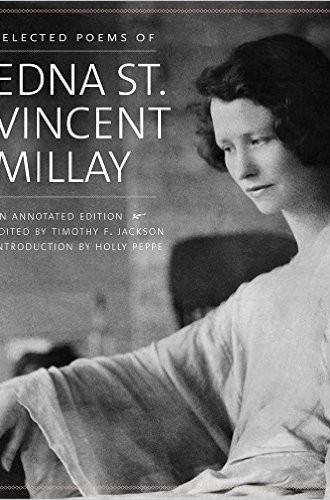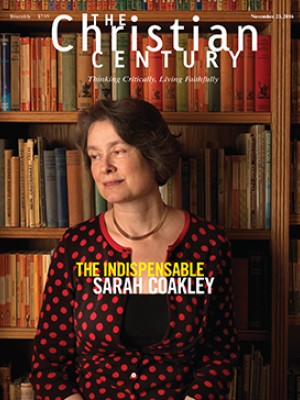Millay the poet, Millay the woman
Readers won't easily trace Edna St. Vincent Millay's personal life in this collection.
For much of her adult life, Edna St. Vincent Millay (1892–1950) lived with her husband on a small farm in upstate New York. Steepletop, near Albany, provided Millay with space to write away from the noise that followed the publication of her earliest books to popular acclaim and her reception of the Pulitzer Prize for poetry in 1923. Millay’s assertive feminist voice challenged social conventions in poems suffused with images from nature.
Timothy Jackson, who received his Ph.D. from the Editorial Institute at Boston University, drew on first editions of Millay’s works between 1917 and 1954 for this scholarly collection. He strives to counter the traditional preference for Millay’s early writings—she tarnished her own reputation with universally panned propaganda poems during WWII—by providing a more balanced selection spanning her professional life. He also includes Millay’s wonderful self-portrait, “E. St. V. M.,” previously unpublished in any anthology of her collected poetry.
Read our latest issue or browse back issues.
Millay’s poem “Renascence” first drew her talents to national attention. The narrator of the poem encounters the immense suffering of humanity and individual finitude in a state of life-in-death. Love, however, brings release from the suffocating weight of the grave, a transformation of vision, and new birth through a Pauline conversion of heart in which “night / Fell from my eyes and I could see.” “Renascence” launched Millay’s career, but some critics wondered how a “sweet young thing of twenty” could write with such potency: “it takes a brawny male of forty-five to do that.” Millay responded to the faultfinder with a nymphish photo and characteristic verve: “The brawny male sends his picture. I have to laugh.”
Millay’s poetry represents a unique American iteration of 20th-century modernism. In “Sonnets from an Ungrafted Tree” (1923), for example, Millay explores the perspective of a woman newly widowed after living imprisoned in an unhappy marriage. The poem opens with the woman entering into “his house” but “Loving him not at all.” The man dies, and the woman sets about her daily tasks with chin set forward. The scene advances with evocative descriptions of “locusts rising raspingly,” “green logs with a wet gray rind,” and “sleeping ashes.” Millay’s haunting images advance the narrative and reveal a somber portrait of an individual worn by obligation:
She gave her husband of her body’s strength,
Thinking of men, what helpless things they were.
Married to a foreigner, she sees the man lying “severe and dead” before her.
Millay, who had an open marriage, engaged in numerous affairs with men and women. Thinly veiled allusions to Millay’s fleeting romantic desires abound in insinuations of imprudent love, alterable moods, and brittle oaths. “Faithless am I save to love’s self alone,” she wrote in A Few Figs from Thistles (1920–22).
But readers won’t easily trace Millay’s personal life in this collection. Holly Peppe, Millay’s literary executor, writes in the introduction that her mission is to dissociate Millay’s biography from her poetry. “I had not been attentive enough to the shifts between poet and persona,” Peppe claims, and “I abandoned the notion that her poems were like pages torn from her diary.” Jackson follows Peppe’s lead throughout the text, providing only occasional biographical context and virtually no theoretical assistance for newcomers.
Millay’s previously unpublished prose manuscript, “Essay on Faith” (1911), written when she was not yet 20, is one of the gems of this volume. The essay divulges Millay’s independent spirit and critical mind. “If you cannot worship God whom you have not seen,” Millay writes, “worship the sun.” The essay indicates that Millay’s concern for being and finitude in “Renascence” was no mere commercial ploy. The essay asserts the freedom of the self against responsibility for the other: “The universe is made up of a million universes, each one as big as itself, for all infinities are equal.”
Jackson fails, however, to include poems prominently exhibiting spiritual themes among selections from Millay’s later works, giving the impression that she simply moved on from such youthful musings. Millay’s The Buck in the Snow and Other Poems (1928), for example, contains a scathing treatment of religion but is left out of this volume. In “To Jesus on His Birthday,” she portrays a silver-tongued preacher who drones on before an audience concerned only with material possessions, while the rolled stone of the resurrection suffocates the mouth of God: “How mute you lie within your vaulted grave.”
Dismissing such potent works (the politically charged “Hangman’s Oak” also comes to mind) magnifies the impact of presenting Millay’s poetry largely dissociated from her personal life—the woman whose affairs, addictions, and political views made her such a fascinating and complicated artist. Her poetry attends to themes that touch every generation—death, faith, love, grief. But if there is to be a revival of Millay’s reputation in our own day, and I hope there is, the full complexity of her poetry and persona will need to be underscored by more substantial critical analysis than is found in this otherwise delightful volume.






